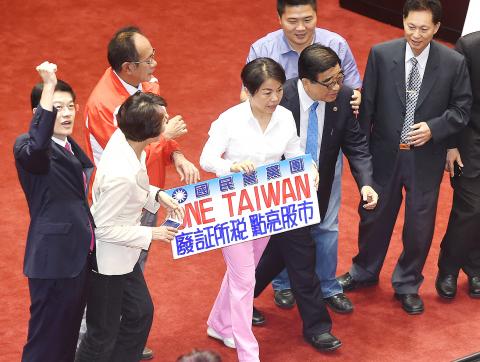The two major political parties yesterday found common ground as lawmakers passed an amendment to abolish the yet-to-be-implemented capital gains tax by an overwhelming majority.
The Chinese Nationalist Party (KMT) and the Democratic Progressive Party (DPP) caucuses submitted separate proposals to amend the Income Tax Act (所得稅法) to terminate the tax on capital gains, effective Jan. 1.
The difference in the versions lay in the explanatory section. The KMT stressed a “dynamic relationship” between the securities transaction tax and the capital gains tax, while the DPP panned President Ma Ying-jeou (馬英九) for advancing the policy. The DPP’s version was voted down.

Photo: Liao Chen-huei, Taipei Times
The KMT version, which was put to a vote along with a proposal from the New Alliance — which also called for ending the capital gains tax — cleared the floor, with KMT Legislator Tseng Chu-wei (曾巨威) abstaining from the vote and People First Party Legislator Thomas Lee (李桐豪) voting against the measure.
Tseng, a former finance professor nicknamed “the cannon of tax reform,” has long been a strong supporter of the capital gains tax, and said that yesterday’s action was the “black Friday of tax reform.”
“As a finance and tax academic, I am deeply regretful and heart-stricken. We should not be afraid to make wrong decisions,” Tseng said.
“The only thing we should be afraid of is not being able to learn from mistakes to find an answer that is more reasonable and fair,” he said.
He said he still hopes the “distorted tax structure” — including the securities transaction tax — could be altered to restore the idea of fairness that “as long as there are gains, tax should be levied.”
A resumption of the capital gains tax was forced by the KMT in 2012 “with its substance totally out of line,” and still saw its end yesterday after several rounds of revisions, he said.
While capital gains will not be taxed, “the Ministry of Finance still will not reduce the current securities transaction tax,” Lee said. “Taiwan’s capital market will be seriously restricted.”
A 0.3 percent transaction tax is imposed on stock market investors.
DPP Legislator Lee Ying-yuan (李應元) said Ma had foisted the policy on the nation without proper discussions and the KMT “lacked core values,” demonstrated by its former and current presidential candidates proposing different versions of the amendment.
Lee said tax reforms should be deliberated “as a whole” if changes are to be made in the name of social fairness and justice.
The proposal to tax some capital gains from the stock market was passed by the legislature in the middle of 2013, but its implementation was later delayed to 2018 because of fears it would negatively affect turnover in the local stock market.
Opponents said the mere existence of the measure was scaring away investors.
Additional reporting by CNA

CHAOS: Iranians took to the streets playing celebratory music after reports of Khamenei’s death on Saturday, while mourners also gathered in Tehran yesterday Iranian Supreme Leader Ayatollah Ali Khamenei was killed in a major attack on Iran launched by Israel and the US, throwing the future of the Islamic republic into doubt and raising the risk of regional instability. Iranian state television and the state-run IRNA news agency announced the 86-year-old’s death early yesterday. US President Donald Trump said it gave Iranians their “greatest chance” to “take back” their country. The announcements came after a joint US and Israeli aerial bombardment that targeted Iranian military and governmental sites. Trump said the “heavy and pinpoint bombing” would continue through the week or as long

TRUST: The KMT said it respected the US’ timing and considerations, and hoped it would continue to honor its commitments to helping Taiwan bolster its defenses and deterrence US President Donald Trump is delaying a multibillion-dollar arms sale to Taiwan to ensure his visit to Beijing is successful, a New York Times report said. The weapons sales package has stalled in the US Department of State, the report said, citing US officials it did not identify. The White House has told agencies not to push forward ahead of Trump’s meeting with Chinese President Xi Jinping (習近平), it said. The two last month held a phone call to discuss trade and geopolitical flashpoints ahead of the summit. Xi raised the Taiwan issue and urged the US to handle arms sales to

State-run CPC Corp, Taiwan (CPC, 台灣中油) yesterday said that it had confirmed on Saturday night with its liquefied natural gas (LNG) and crude oil suppliers that shipments are proceeding as scheduled and that domestic supplies remain unaffected. The CPC yesterday announced the gasoline and diesel prices will rise by NT$0.2 and NT$0.4 per liter, respectively, starting Monday, citing Middle East tensions and blizzards in the eastern United States. CPC also iterated it has been reducing the proportion of crude oil imports from the Middle East and diversifying its supply sources in the past few years in response to geopolitical risks, expanding

Pro-democracy media tycoon Jimmy Lai’s (黎智英) fraud conviction and prison sentence were yesterday overturned by a Hong Kong court, in a surprise legal decision that comes soon after Lai was jailed for 20 years on a separate national security charge. Judges Jeremy Poon (潘兆初), Anthea Pang (彭寶琴) and Derek Pang (彭偉昌) said in the judgement that they allowed the appeal from Lai, and another defendant in the case, to proceed, as a lower court judge had “erred.” “The Court of Appeal gave them leave to appeal against their conviction, allowed their appeals, quashed the convictions and set aside the sentences,” the judges